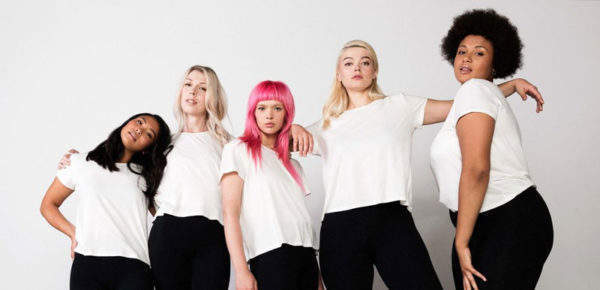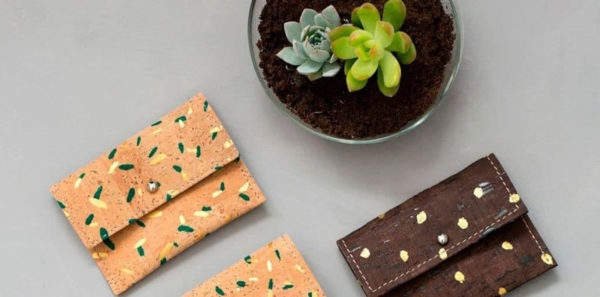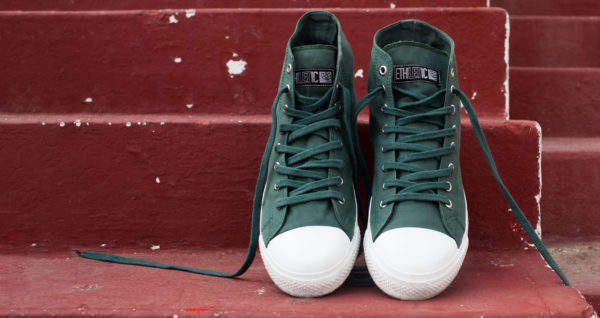
Cruelty-free vegan fashion is on the rise. Many animal-lovers and ecologically conscious clothes enthusiasts opt for vegan fashion brands that promise sustainable and environmentally friendly garments. But vegan fabrics aren’t always environmentally friendly.
As more and more consumers wake up to the high cost of cheap clothes for both humans and the environment, ‘ethical’ and ‘sustainable’ have become two of the biggest buzzwords in the fashion industry.
However, many consumers feel that unless the clothes are vegan, applying those terms is just greenwashing. Advocates for vegan fashion argue that leather, fur, wool, cashmere and other animal-derived materials pollute the planet, endanger workers’ health and cause animals to suffer needlessly.
But vegan fashion brands can have their own sustainability issues too, in the form of plastic.
Vegan fashion brands often use plastic
While vegan fashion is currently on demand for its cruelty-free clothes, people often forget about the environmental impact of some fabric alternatives. In order to replace animal-derived materials such as fur, silk or leather, brands often opt for plastic-based alternatives, which contribute to environmental damage, particularly in the oceans.
Vegan leather is often made of polyvinyl chloride (PVC) or polyurethane (PU). Not only are they made from petroleum, a non-renewable resource, but they are not biodegradable and so are playing a key role in the growing presence of plastic in the oceans.
While there are more ecological alternatives for leather such as cork, pineapple leather and mushroom, products using those fabrics are often hard to find as they can be expensive to produce.
It’s not just vegan leather, though. Faux fur, which is extremely popular among fashionable animal lovers, is also made out of plastic. Other fabrics that are essentially plastic include lycra, elastane, polyester, polyamide, nylon, viscose and spandex.
Clothing is contributing to ocean plastic
Concerns around ocean plastic are on the rise, and much of the focus has been on the impact of plastic bottles, coffee cups and straws. However, the fashion industry actually accounts for 15-30% of plastics found in the oceans, according to the International Union for Conservation of Nature.
Although most vegan fashion brands claim that their fabrics are made of recycled plastic, these brands can’t stop the microfibres these clothes release making their way into waterways.
It has been found that synthetic materials release microfibers each wash. These microfibers then travel to the local wastewater treatment plant, where up to 40% of them enter rivers, lakes and oceans.
To make matters worse, recent studies have even suggested that the plastic recycling process is contributing to ocean pollution in its own right.
While more brands than ever are committed to providing organic clothing, many brands still use plastic in most of their garments, including high-profile names such as H&M and Stella McCartney. So are there any completely plastic-free vegan fashion brands?
Eight plastic-free vegan fashion brands
Loomstate

Loomstate believes that a sustainable system is one where everyone wins environmentally, socially and economically. The company uses only 100% certified organic cotton in the production of its garments, and all their clothes are made in a GOTS-certified factories. The prices are on the higher end, but the brand believes in creating a garment that is built to last. Loomstate sells both men’s and women’s shirts and layers, as well as baby onesies and tote bags. The company also produces uniforms and corporate wear, which are also made using organic material. The brand also does a number of limited-edition collaborations. While the company is based in the US, it offers international shipping.
Plant Faced

Plant Faced offers vegan clothing made from organic cotton for both men and women. It is committed to maintaining its presence as a 100% ethical, independently owned vegan streetwear brand. All of Plant Faced’s clothes are made using organic or plant-based materials and dyed using water-based inks. These are safer than the plastisol inks used on the majority of printed garments that contain PVC and phthalates. The brand also sells accessories such as caps and tote bags, which are made using organic cotton and chino cotton.
Naiad

All of Naiad’s clothes are created using natural plant fibres, including organic cotton, and natural dyes. Every garment is handmade in Milan, and the company is also dedicated to ensuring consumers know the journey of each garment. All of the clothes are also delivered using sustainable packaging. Naiad’s collections are made for women, and inspired by nature. Current Naiad collections include islands, waves, depth, rock and gold.
Miakoda

Miakoda prides itself on its commitment to sustainability and ethics. The company wants to change the way we consume, shop and treat our planet, animals and each other. All of the fabrics used by the brand are made with sustainable plant fibres. These include organic cotton, bamboo, soy and modal, and the brand is continuously looking to source new plant-based fabrics. The packaging is also made of 100% recycled post-consumer and post-industrial content. Miakoda’s clothes are designed for women. The brand aims for all of its clothes to be comfortable, and make women feel good physically and mentally when wearing them.
Noumenon

Noumenon’s clothes are designed for women who want garments that are ethically produced yet sophisticated. The brand’s fabrics include ramie, which is a natural vegetable fibre used for silky garments, pure linens, organic cotton, lyocell and modal. All of these are plant-based and do not contain any plastic. Noumenon creates timeless clothes that are versatile and can be worn any season in order to encourage more sustainable use of its products.
Xianna

Xianna specialises in handmade accessories, including purses and wallets, backpacks, belts and bags. All of the brand’s products are made in Madrid using cork from Spain and Portugal and, where necessary, lined with organic cotton. It has been vegan-approved by PETA, and none of its products contain any plastic-based materials.
Corkor

Corkor is a vegan accessories retailer specialising in fake leather accessories made of cork. All of its products are 100% animal free and plastic-free. Corkor sells handmade men’s and women’s accessories, including wallets, satchels, belts, briefcases and card cases. The brand does not mass produce its products, and instead manufactures only small batches or makes products to-order.
Ethletic

Ethletic, a German vegan and sustainable athletic brand, specialises in sports shoes, as well as flip-flops and t-shirts for both men and women. All of its products are manufactured in Pakistan using Pakistani organic cotton and Sri Lankan natural rubber, ensuring that its products do not contain any plastic-based material. All of Ethletic’s shoes and t-shirts are made using 100% vegan raw materials derived from farming areas that do not compromise animal habitats.







